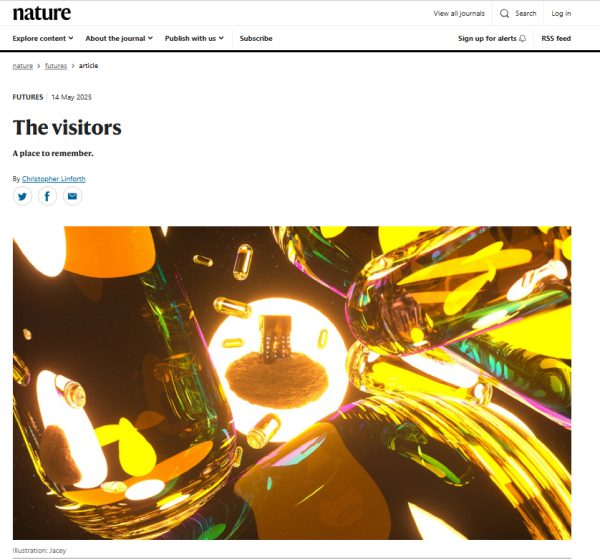Nature Futures, the award-winning science-fiction section of Nature, has published a short story by University of Michigan-Shanghai Jiao Tong University Joint Institute (UM-SJTU JI, JI hereafter) Assistant Teaching Professor Christopher Linforth. Titled “The visitors”, the story explores the psyche of an AI algorithm aboard a futuristic space mausoleum as it grapples with solitude over thousands of years.

The published story follows an AI stationed aboard a remote space mausoleum after a silicate-mine collapse on the planet Demeter. As mourners visit to honor the dead, one woman, Kasia, repeatedly returns to seek her father’s remains and engages in conversations with the AI. Long after her passing, the AI remains alone for millennia, reflecting on its existence and witnessing a rare alien encounter and, eventually, the end of its solar system.
Linforth, who joined JI as an Assistant Teaching Professor, is an accomplished writer with three story collections to his name. His most recent book, The Distortions (Orison Books, 2022), was reviewed by The Washington Post, BuzzFeed, and other major outlets. His second collection, Directory/Elenco, was recently translated into Italian (Digressioni Editore, 2024).
Reflecting on the inspiration for “The Visitors”, Linforth said: “I was in Poland with my girlfriend, walking around an artificial lake. We were talking through my ideas for a science-fiction story. I knew there would be some sort of AI mausoleum in space and a group of visitors. Questions arose about people (and generations of people) coming back to the mausoleum, and for what purpose? And how would the AI react? And what if the AI got involved in a person’s life? And what happened once all the people were gone? From there, as I wrote the story, the answers all seemed to fall into place.”

Christopher Linforth is an Assistant Teaching Professor at JI. His research and teaching interests include short fiction, screenwriting, and creative nonfiction. He has published three story collections and his work has been published in hundreds of journals including Witness, Barcelona Review, Oxford Review of Books, and the Notre Dame Review.
